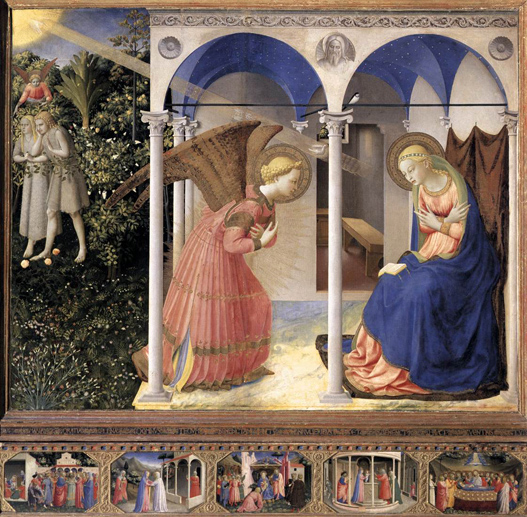"You don't have acedia, because you still care. If you care enough to read a book about acedia, you don't have acedia." --A friend
I'm reading the book
Acedia and Me, by Kathleen Norris. I've been meaning to read more of Norris' writing ever since I read
Cloister Walk in college. Norris is a protestant writer who fell in love with Catholic liturgy and became a Benedictine Oblate. I love her because she reminds me that I am not alone in the world. When I am feeling too lazy to write, or am having trouble explaining why something moves me, reading spiritual memoir is incredibly helpful. It's necessary. The spiritual writings of women like Norris, women like Anne Lamott or Lauren Winner, give voice to my internal spiritual and emotional tensions, serving as spiritual direction when I have lost my way.
In her book, Norris defines acedia as a lack of care: a spiritual and psychological malaise that combines the worst bits of sloth and depression. I began reading this book several months ago, but put it down because the heavy tone of the book and its correspondence to my own life was too much for me to carry. Also, I was visiting Chicago at the end of winter; the season itself had succumbed to acedia. But I have taken the book up again this fall, because the topic still spoke to me. I am nearly done with it now, in the final chapter, and I am so glad to have walked with Norris thus far. She knows the things I ought to know. She knows that constant meditation on the Psalms is deep, good, sweet food for the soul. And she is incredibly gracious with herself. I mean, unbelievably. And that same graciousness has unexpectedly encouraged my Christian walk more than anything else has in a long, long time.
I have a tendency to see God as an irritated, disapproving, wrathful taskmaster, as a person waiting for me to make mistakes so he can fall out of love with me. But when I speak of these anxieties with others, with people who have walked with God more closely than I, I always get the same response: "You don't have to try so hard."
Norris quotes Evagrius, and many others who have written and lived in the monastic tradition. Have I ever mentioned that the very word monasticism draws me in with an irrepressible force? It does. Somehow, on some level, I am a monastic. It's my nature. Anyway, there is one section where she quotes an elder monk speaking to a brother on the nature of life. He says, "Brother, the monastic life is this: I rise up, and I fall down, I rise up, and I fall down, I rise up, and I fall down."
This is an incredibly helpful statement, and it relates to Calvin's doctrine of the perseverance of the saints. Sometimes I struggle with understanding how I can lose so much ground in an area of my life that I had previously excelled in. I used to be so good at monasticism! I used to carry around a book of common prayer, and illustrate miniature manuscripts of the Psalms to hang on my walls to meditate on throughout the day. I used to shun television because I wanted only holy thoughts to be stuck in my head, and it worked, and it was well with my soul. But I have almost forgotten how to live this way, and I only sort of care.
But, Norris reminds me, the Christian life is all rising and falling. But the life of the faithful one, the one to whom Christ offers a white robe, the one who endures, is the one who continues to rise and fall. The faithful life is one which is full of new beginnings. The faithful person is one who does not give way to acedia after falling yet again into an old vice. The faithful person continually begins again. This is how I want to think of my life, and this is what I mean when I say that Norris is unbelievably, incredibly gracious. She can accept her own humanity. Isn't that beautiful?
In other news, Norris also brought to my consciousness the idea that I am not immortal. I mean, I am going to live in heaven forever with God, but first, I will die. This is actually a very refreshing thought, because it is easy for me to become discouraged in what Norris calls the "endless cycle of now," that I envision as my future. The thought that time is not an unlimited resource is difficult for me to believe, but accepting this truth is essential if I want to live free of acedia. If time is limited, then it is precious. And if time is precious, then it actually does matter how I spend it. I am re-resolving to live faithfully. Therefore I will feed on the Psalms, I will write daily, and I will always begin again.
The "cure" for acedia, as I see it, apart from therapeutic and spiritual intervention, is faithfulness. Faithfulness is just another term for beginning again. The faithful person joyfully seeks the monochromatic repetition of each day, knowing that it is in these hopelessly boring rituals that faithfulness is wrought in the soul. So I'll leave you, dear reader, with this prayer, which Norris quoted in her book:
This is another d.ay, O Lord. I know not what it will bring forth, but make me ready, Lord, for whatever it may be. If I am to stand up, help me to stand bravely. If I am to sit still, help me to sit quietly. If I am to lie low, help me to do it patiently. And if I am to do nothing, let me do it gallantly. Make these words more than words, and give me the Spirit of Jesus. Amen.





